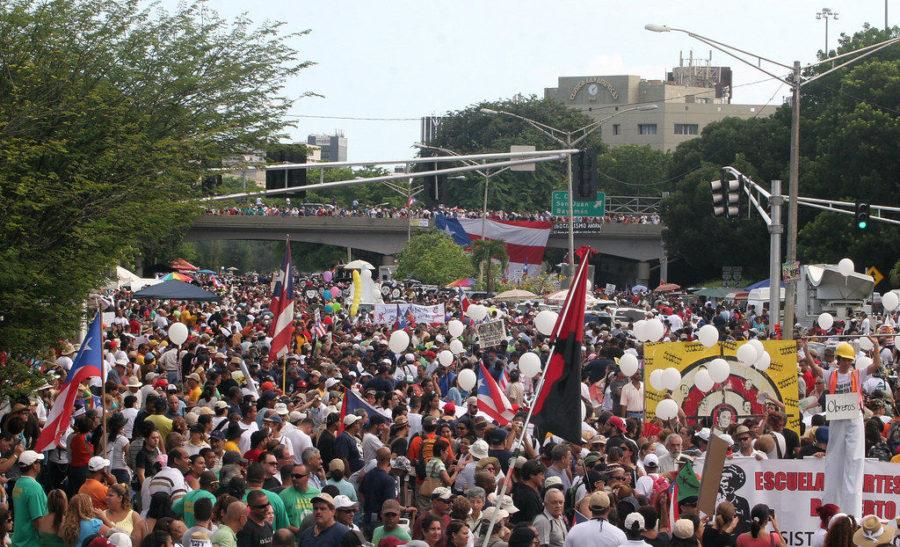Editorial: Protest is powerful
Puerto Rico Paro Nacional
July 26, 2019
After 12 days of protests on the island, Gov. Ricardo Rossello of Puerto Rico has submitted his resignation effective 5 p.m. Aug. 2. The protests began after around nine hundred pages from a group chat that Rossello moderated revealed unnerving depths of corruption within the government. In these messages, Rossello and his associates in the chat — from both government and the private sector — revealed them mocking citizens and the more than 4,600 deceased citizens from Hurricane Maria, using homophobic and misoginistic tropes, inciting violence against other elected officials and unethical relationships between the lobbyists and government officials.
To add insult to injury, the messages began leaking on the eve of the FBI arresting his former secretaries of education and the health insurance administration on counts of multi-million dollar fraud of public funds. The people of Puerto Rico had had enough and took to the streets. If nothing else, the people of Puerto Rico have proven that democracy is not a once-every-four years chore of going to the ballot box, but rather it is an ongoing and deliberate action of defending its core beliefs and principles from every threat.
When the protests began, Rossello held firm in his belief that he should finish his out his term which began upon his election in 2016. He offered mild concessions of promising to not run for reelection as well as resigning from his party’s leadership. In short, he was adamant that it would be undemocratic for him to resign when he was the dutifully elected governor of Puerto Rico. This “fixed-view” of democracy is not only wrong, but it is also dangerous.
While people in a democratic society suffer the consequences of elections, it is not a mandate for them to suffer in silence. It is their right, if not their responsibility, to question governance, voice their opinions and stand up for what they believe to be right. This is what the people of Puerto Rico did. Puerto Ricans were tired of decades of corruption at the highest level of the government, and when the smoking gun was right in front of them, they said ‘no more.’ They went to the streets and questioned the rule of a governor who mocked them, mismanaged their funds and uplifted special interests above the interests of the people. Not through violence, but the actions of the people spoke for themselves when close to a million people stood out on Monday during scorching heat and pouring rain to demand a governor elected by around 630,000 votes to resign.
Democracy is an on-going task. The governor has resigned, but Puerto Ricans have shown no desire to stop protesting. There is still corruption in the government and transformative change won’t begin with the resignation of one man and Puerto Ricans will not wait for the ballot box in 2020.
Too often, both in Puerto Rico and the U.S. mainland, the idea of protest is dismissed as silly, unproductive and even inconsequential. We place the value of elections on such a high pedestal that it seems as though it is the only option for citizens to participate in their democracy. Limiting our involvement to elections is an affront to both democratic ideals and our freedom of speech.
Time and time again throughout history, people have shown the importance and impact of tending to our democracy and exercising our rights continuously. Martin Luther King Jr.’s 1963 March on Washington D.C., the 1969 Stonewall Riots and — over the past two weeks — the people of Puerto Rico have proven this. All these are examples of democracy in action, the act of continuously ensuring the safeguard of your beliefs and values well into the future.
Editor’s Note: The original editorial had an incorrect estimate of the number of deaths related to Hurricane Maria. The editorial has been updated to reflect a more accurate death total. The Daily regrets this error.

















